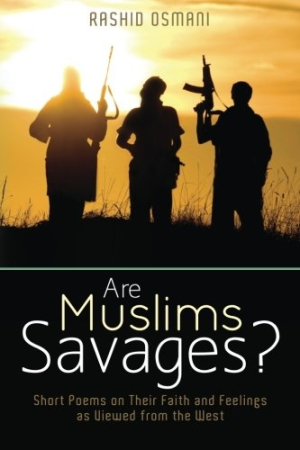It looks like you've stumbled upon a page meant to be read by our code instead of viewed directly. You're probably looking for this page.

Are Muslims Savages?
Short Poems on Their Faith and Feelings as Viewed from the West
Osmani urges his fellow Muslims to choose faith over invectives in well-crafted poetry.
Rashid Osmani, an Indian-born engineer who found his way back to Islam as an adult, was troubled by how dramatically the West’s perception of Islam changed in the wake of 9/11, and by how this fresh negativity enabled Westerners to remain silent in the face of injustices visited on Muslim innocents. The collection of poetry in Are Muslims Savages? approaches these conflicts and their myriad implications with sensitivity and often brutal honesty.
The chapters of Osmani’s collection follow a specific format: prefatory musings, poems followed by explanations, and received feedback for each poem. In the first section, Osmani deals with the high costs of anti-Muslim sentiment in the new millennium. The incarcerated narrator of “Guantanamo Blues,” the stunning header of the collection, disbelieves justice is even possible and begs for death. “Loving forgiveness awaits me in the next world,” he says, and then repeats the refrain, “let me go.” Later poems take on the Obama administration for its use of drone aircraft and address confrontations such as those surrounding the so-called “Ground Zero Mosque.”
The second chapter appeals to Muslims dealing with such injustices, encouraging them to choose faith over returned invectives, championing trust in God over flash-boiled reactions. It acknowledges the horror of intentionally provocative renderings of Muhammad but decides “a community in distress doesn’t need more stress. / Use soothing words to calm unrest.” The fourth and final chapter is a reflection on Sufi ideals. It drives at the heart of the mystical branch of Islam, often very beautifully. “The essence of my being / weightless, sexless and un-aging / will taste death, but never die,” it marvels, and “just when I think I know / every way … I find another one.”
The third chapter is the most polarizing. In it, Osmani discusses the troubled meeting of Muslim precepts with Western “permissiveness.” These poems have a sanctimonious air; in them, he takes on feminism, sexual freedom, and LGBT issues. He is unapologetic about commitment to strict Muslim positions, using terms like “fornication” and “debauchery” to describe Western behaviors and laws. Aspersions cast Israel’s way can be troubling, and the perception that its lobbies direct American political sentiments can be easily challenged. Such judgments will find a less sympathetic audience than other chapters.
Osmani’s verses often suggest strong poetic sensibilities, though his skill at marrying tough topics to a delicate medium can be overwhelmed by subsequent exposition. The provided explanations of his poems deprive readers of the ability to derive meaning independently. Included reader feedback further weighs the project down and comes to seem self-congratulatory.
For its honest insight into the challenges that modern Muslims face, Are Muslims Savages? warrants a thoughtful reading. Osmani’s refusal to sugar-coat or conceal certain doctrinal positions deepens the project’s authenticity, though such positions may not earn rejoinders. The apologies Osmani offers early on reflect his awareness that honesty sometimes alienates, but perhaps it also makes mutual understanding more possible.
This collection is a veracious and provocative contribution to ongoing conversations about Islam and the West.
Reviewed by
Michelle Anne Schingler
Disclosure: This article is not an endorsement, but a review. The publisher of this book provided free copies of the book and paid a small fee to have their book reviewed by a professional reviewer. Foreword Reviews and Clarion Reviews make no guarantee that the publisher will receive a positive review. Foreword Magazine, Inc. is disclosing this in accordance with the Federal Trade Commission’s 16 CFR, Part 255.